#cypriot traditional clothes
Text


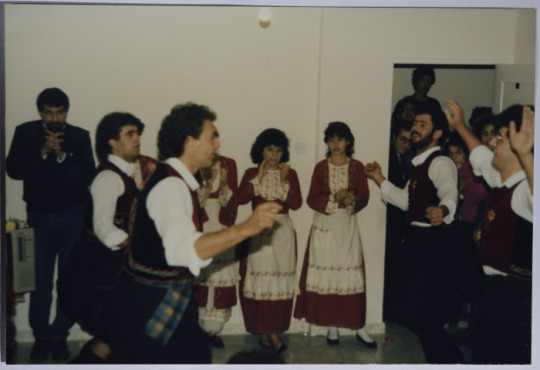


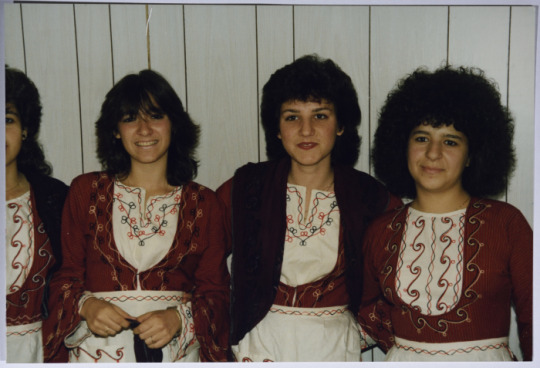
Coloured photographs of a celebration held by the Union of Cyprus Youth for the Wounded from the war on Lebanon while receiving treatment in Cyprus.
Image source and information by Samar Ozrail, "The Palestine Red Crescent Society Collection". Archival Inventory. 30 April- 5 June 2018. The Palestinian Museum Digital Archive.
#cypriot#cyprus#archive#history#photography#union of cyprus#lebanese civil war#lebanese history#cyprus archive#cypriot traditional clothes#cypriot clothes#cypriot dance#cyprus history#cypriot history
53 notes
·
View notes
Text

Greek Cypriot dancers, from Cyprus, by United Cypriots of Southern California
#greek cypriot#greek#cyprus#europe#eastern europe#traditional fashion#traditional clothing#cultural clothing#folk clothing
187 notes
·
View notes
Note
In The Iliad it's mentioned that Helen wears a veil. With "veil" I automatically imagined something similar to what is often used in weddings nowadays (more specifically, translucent ones) but tied back with some accessory instead of covering her face (the translation I read of The Iliad says that Helen has "beautiful braids", so I imagine she had an intricate hairstyle. Considering she is shown having female servants, I imagine they did them for Helen) and probably with a colorful color. I looked up Greek veils to get an idea and it seemed to me that they were more non-translucent cloths that sat on top of the head, some tied to cover the hair and others kind of loose (I saw statues and images of them that showed them kind of long when placed loosely, including). Some seemed to be "fitting" into the dresses, but that could just be me being confused by the images I saw being colorless.
My ask is: do you have any idea what kind of ancient Greek veil Homer was probably referring to?
Hello! It's very unlikely that the Iliad was written by one person, and it's more likely that many Greek artists throughout the centuries added their own parts or embellished some existing lyrics. There are many clear anachronisms in the text. Likely, the geometric era gals did not cover their hair (from the art I've seen) but a singer in the classical era considered it weird to sing a song about a queen with uncovered hair.
It might be that the old text remained next to the new one, that's why you see the braids and also the veil. But it could also be a narrative trick where the reader/listener can know about both the veil and the braids underneath the veil.
Our ancient, medieval, and traditional head coverings were not translucent. Only in the last decades that we gotten rid of them, we wear transparent ones at weddings. The ancient veils (himatia/pepla) I've seen in ancient Greek art are separate from the dress and worn over it, perhaps wrapped around the dress in various ways. Not having color doesn't help the eye much ����
Like this figure here, the fabrics may appear to be continuous but it's likely there's two of them, seamlessly wrapped.
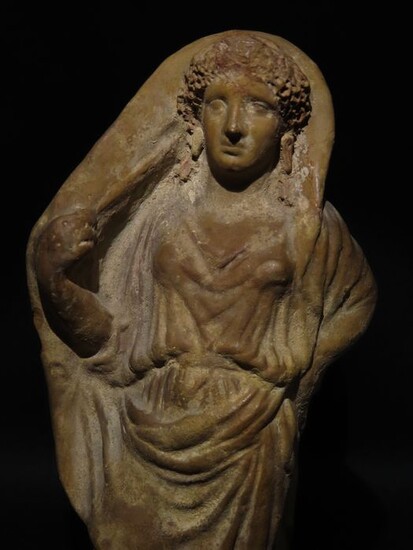
Ancient Greek Terracotta Veiled female figure. H. 21.5 cm. 4th Century BC.

Limestone statue of a veiled female votary. Cypriot 1st century BCE
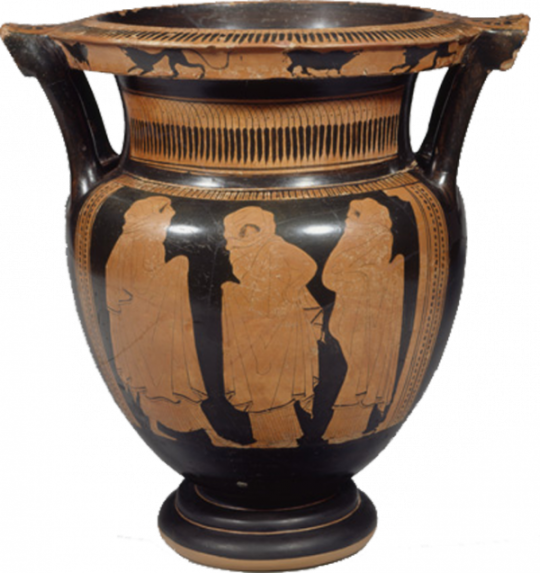
Veiled women dancing to a double flute Clay, red-figure, 450-440 BCE
Some more possible styles:

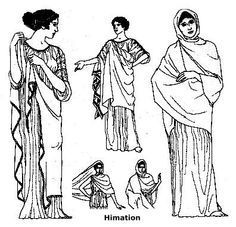

Spartan women also veiled in later centuries, since the hair was considered a means to attract a husband through beauty (according to Plutarch). Unmarried women didn't have to veil but married women should. This tradition has lasted until the last century in Greece - and it's also in the tradition of other nations. But as you can see the degree of veiling could differ.
13 notes
·
View notes
Text

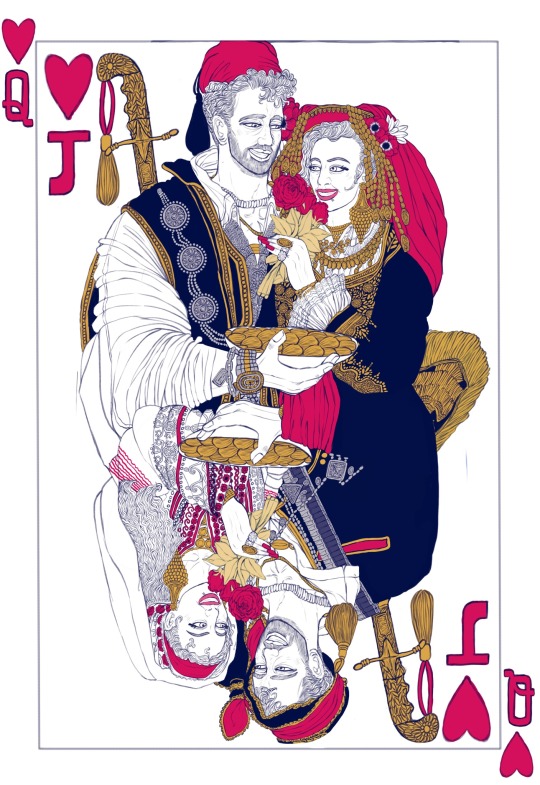
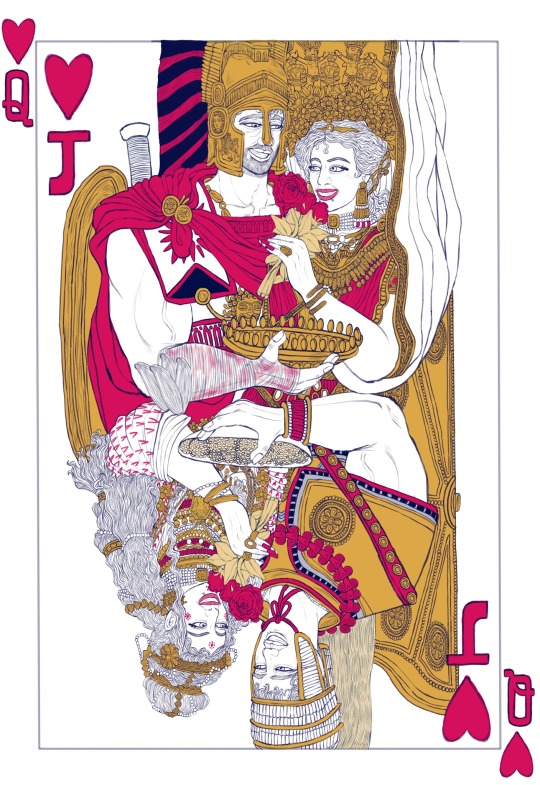

“The Queen of Hearts
She made some tarts,
All on a summer's day;
The Knave of Hearts
He stole those tarts,
And took them clean away.” 🃏❤️
Were inspired from the Halloween posts that I & @greypetrel shared with each other, since both of us still love gothic macabre spooky stuffs & didn’t want Halloween to fully go away. ♥️🃏
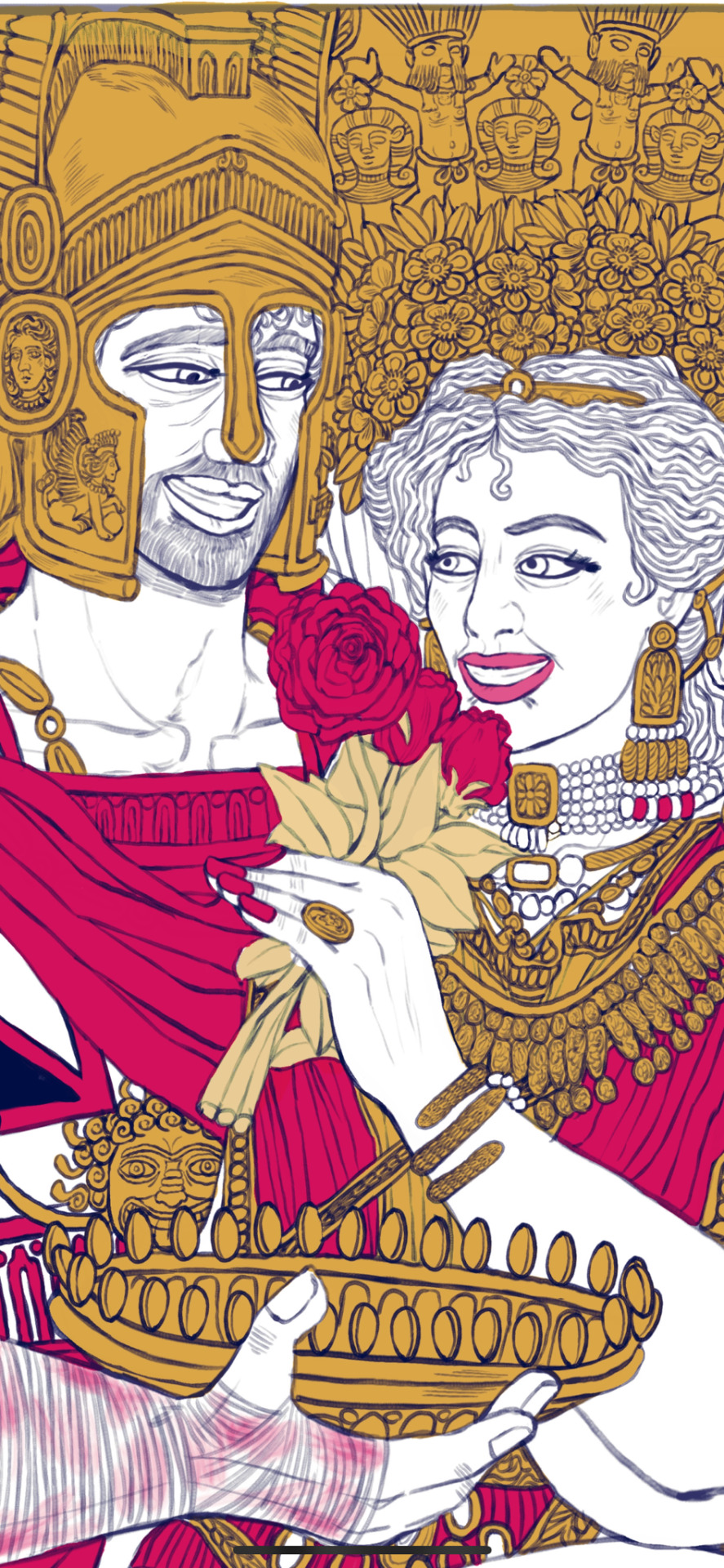

The 1st card depicted the clothing that I often drew them the most:Bronze Age Cypriot-Mycenaean Greek version & Classical-Hellenistic Greek version.
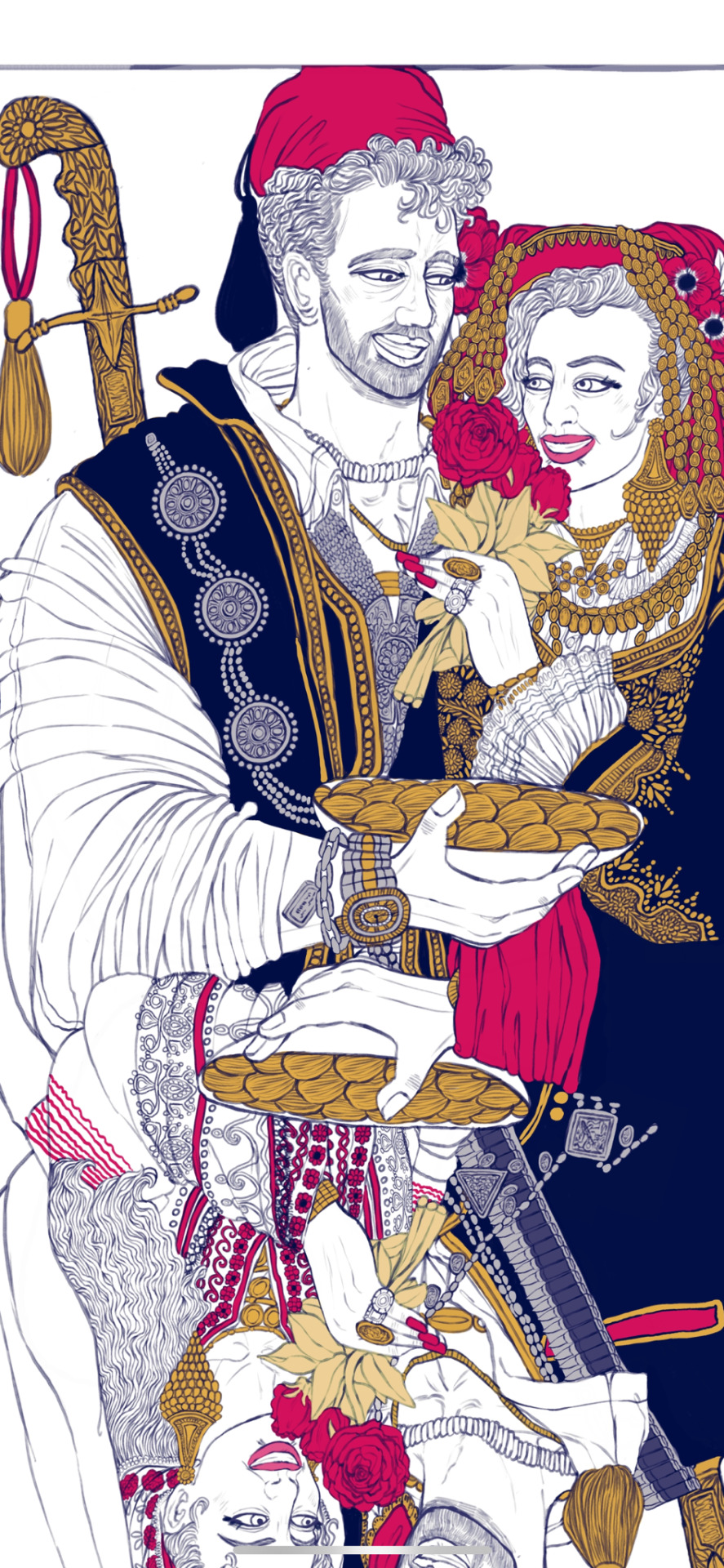

The 2nd one depicts Aphrodite in the festive rouziettin dress that comes from Cyprus’ urban areas & its traditional rural counterpart. It bears similar to the traditional Amalia dress of mainland Greece, and a lot of traditional wedding dresses were also festive dresses, after all. For Ares, his military fustanella dress comes from the region of northern Greece (perhaps somewhere in Macedonia-Thrace since he had always been associated with the military aspects as ”the god of war” & the northern barbarians). He also wore his Pontic Greek clothing as the god himself was also mythologically associated with that area, too. (The story of the Golden Fleece came to mind, as well as Ares’ island and the Amazons, too.)
#ancient greek#aphrodite#ares#my art#mars#venus#greek mythology#greek traditional costumes#greek folk costumes#pontic greek#cyprus
13 notes
·
View notes
Text
Homestuck race/ethnicity nationality headcanons
Since the beta/alpha kids are like pure white in the comics my brain immediately envisioned them as white and unfortunately it’s still the first place my mind goes but I do like to think most of them aren’t totally white
The trolls are based mostly on canon references, vibes, their lands in sburb, and their dancestors
John and Jane: white | polish/dutch | american (washington)
They’re white and nerdy sorry
Rose and Roxy: white/middle eastern | french/egyptian | american (new york)
I’m all for french lalondes but I also remembered Roxy’s planet had pyramids and decided they were Egyptian too
Dave and Dirk: white/east asian | spanish/japanese | american (texas)
The striders live in Texas so they’re most likely Spanish descent but they also reference Japanese culture so often that I just had to include it
Jade and Jake: white/pacific islander | english/tongan | american (phoenix islands)
The Britishness is from Jake and the polynesian part is from jade, they’re tan af
Aradia: latina/east asian | mexican/japanese | japanese
I know that canonically she’s supposed to be Japanese so she is part japanese but the dark curly hair, desert climate, obsession with death (day of the dead) made me assume she was Latina the first time I read the comic 🤷♀️
Tavros: latino/southeast asian | mexican/filipino | mexican
Man’s obviously latino and I made him Filipino because the actor rufioh is based off is filipino
Sollux: white/east asian | french/korean | canadian (quebec)
French because I immediately decided he was Canadian so french is statistically likely but he also has some Asian vibes so I chose the one country that’s split in two, obviously
Karkat: white | romanian/jewish | american (maine)
Karkat is super pale in such a way that his eye bags are extremely noticeable. He’s Romanian as a reference to vlad the impaler and all the castle ruins in Romania which remind me of his land. He’s Jewish for vibe reasons. Maine for lobsters and and crabs 🦀
Nepeta: white | english/german | american (tennessee)
Because I picture her with blonde hair (like a lions mane). She lives near the Smokey mountains where there are a small population of mountain lions and she’s a crazy wilderness explorer. Think of how cute she’d be with a Tennessee accent
Kanaya: south asian/middle eastern | indian/iranian | american (pennsylvania)
Vibes, imagine her in a sari or any other traditional Indian clothes, she’d be stunning
Terezi: white | greek/irish | greek
The scales, democracy, hello? Also she’s absolutely a red head
Vriska: white | greek/turkish | cypriot
Vriska is definitely white and she’s a pirate so instead of Caribbean (which is mostly black) she’s Mediterranean.
Equius: black | sudanese | american (kentucky)
He’s definitely black and he has locs like you wouldn’t believe. Kentucky because of mammoth cave as a reference to his land and also because of the horse derby
Gamzee: black/white | beninese/portuguese | brazilian
Hes definitely black coded in some ways but the icp are white sooo he’s both. I made him Brazilian for carnival
Eridan: white | scottish/english | american (california)
It’s giving imperialism and Silicon Valley simultaneously
Feferi: white/black | italian/trinidadian | italian
The only reason she’s half white is because I picture her with this light red strawberry blonde hair and it’s also a reference to the Roman Empire. She’s Trinidadian because I headcanon meenah as having a voice like nicki minaj
#homestuck#homestuck headcanons#john egbert#dave strider#rose lalonde#jade harley#jake english#roxy lalonde#jane crocker#dirk strider#karkat vantas#aradia medigo#tavros nitram#sollux captor#nepeta leijon#kanaya maryam#terezi pyrope#vriska serket#equius zahhak#gamzee makara#eridan ampora#feferi peixes
37 notes
·
View notes
Text

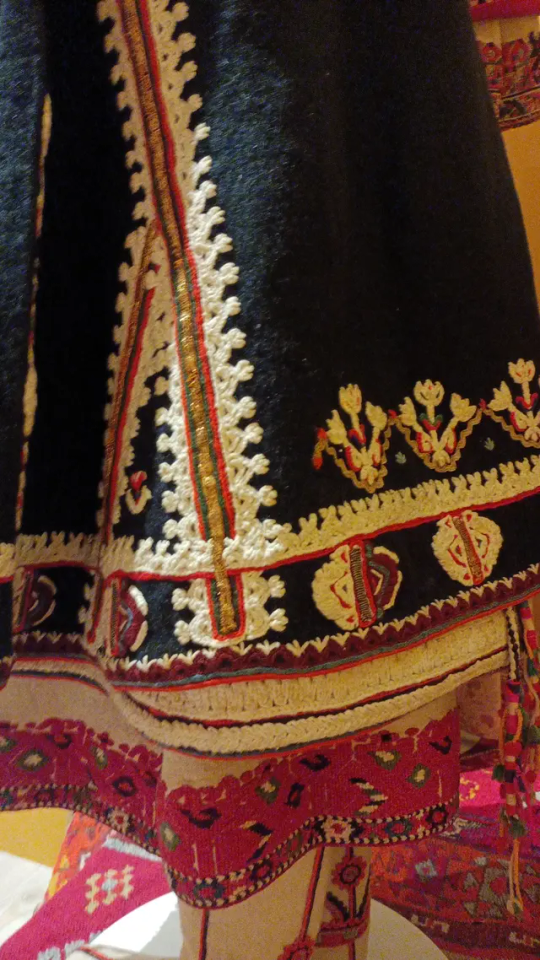
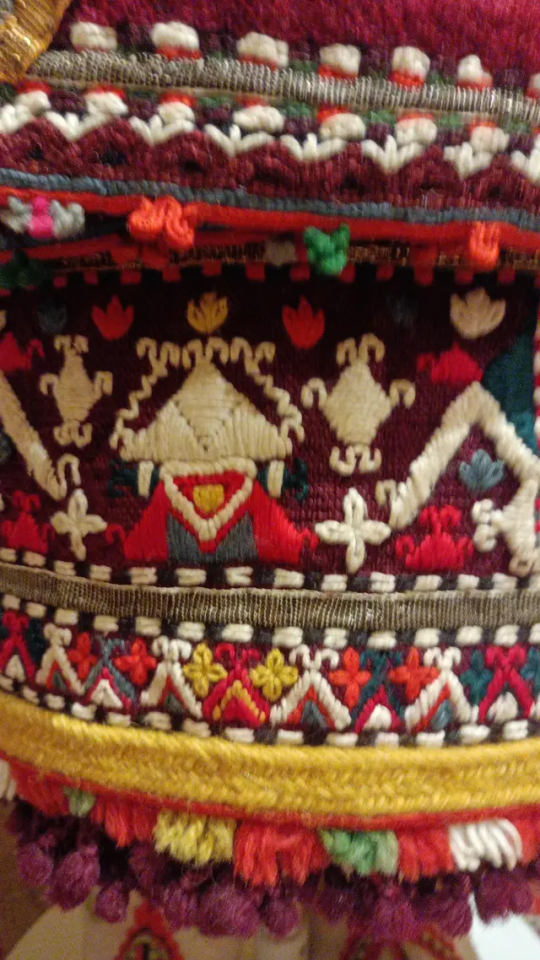
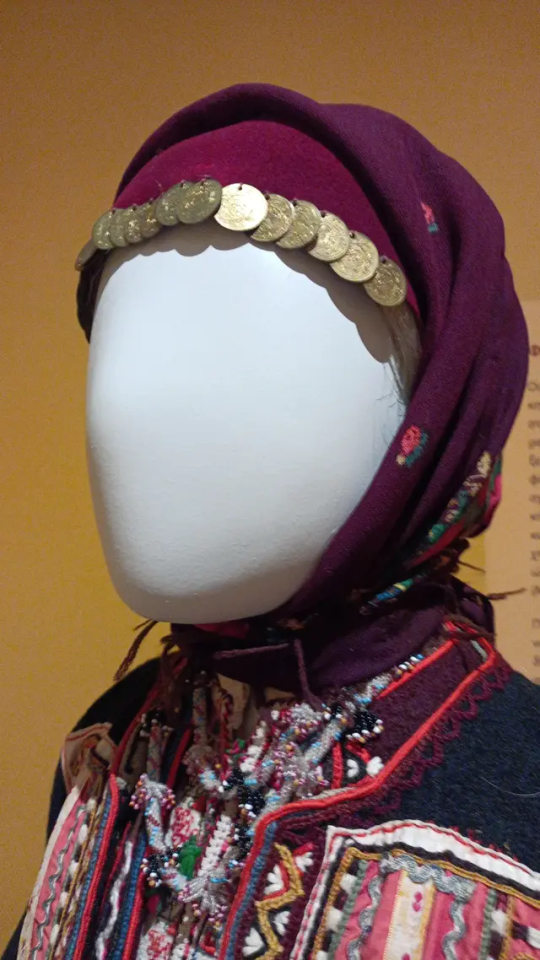
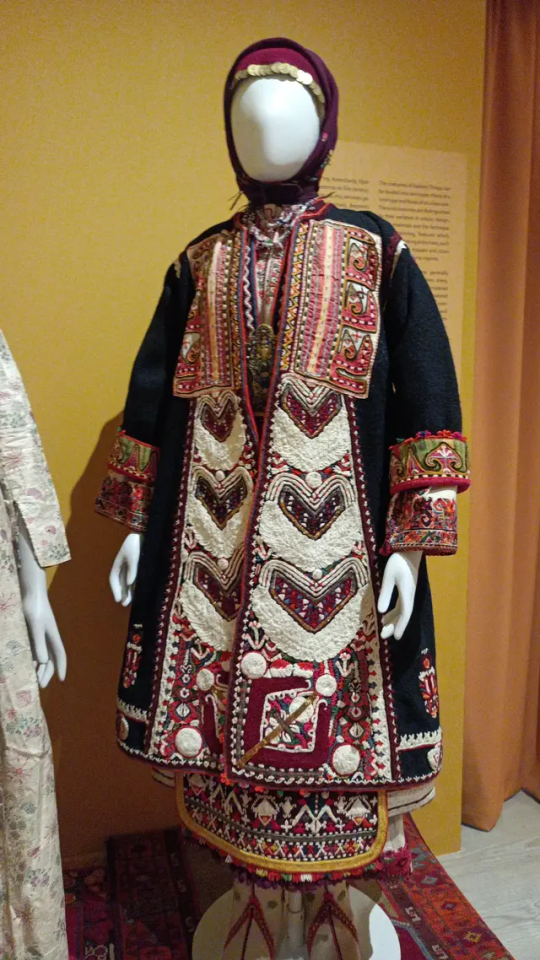




Cypriot traditional clothing
1 note
·
View note
Text
Bazaraki: Check This Before You Buy or Sell There

Bazaraki is the biggest online marketplace in Cyprus, but also one of the most popular. It is the right place to sell anything and attracts thousands of visitors from all over Cyprus. This online market has everything from cars to shoes, clothes and electronic items.
The company offers an easy-to-use app for iOS and Android devices.
You can find everything for sale on Bazaraki. The online marketplace is open 24 hours a day, 365 days a year, which makes it a great choice to sell your items online.
Bazaraki marketplace allows sellers to post their items and be contacted directly by buyers. Unlike other websites that rely on a middleman to do all the work for you, this e-commerce gives you the opportunity to sell your items directly from your own account.
As a seller, you can post an unlimited number of items for free and set a price that is reasonable for you.
Buying and selling on the online platform is very simple.
- Simply create an account.
- Specify your location in Cyprus.
- Choose the item you want to sell or buy.
How do I know if my goods are worth it? What can I make a profit on? Will, what I offer for sale interest people? Where are they coming from?
With this guide, everything will become clearer to you.
What is Bazaraki and what does it offer?
Because the site offers a variety of products: Food, clothing, jewellery, cars, houses, and more. The advertising and buying platform also has many restaurants serving traditional Cypriot cuisine. If you are a seller or buyer or represent a company looking for a place to display your ads, Bazaraki is the right choice for you.
The platform is very user-friendly and easy to navigate.
You can use the site on both mobile and desktop computers to find what you are looking for or even make a sale.
The team behind Bazaraki seems to be constantly working to improve the platform and add new features so that sellers and buyers can benefit.
How did Bazaraki become the largest marketplace in Cyprus?
Without a doubt, the platform is the largest marketplace in Cyprus for a reason: the company focuses on bringing buyers and sellers together. This creates a platform for growth and support that helps businesses thrive. The company was founded in 2007 and has since brought thousands of customers together every day.
With 11-50 employees and its headquarters in Limassol, Bazaraki is a role model for other companies in Cyprus.
What makes this particular online ad platform the largest marketplace in Cyprus is the fact that it brings together thousands of buyers and sellers across the island every day. With over 880k daily organic visitors. However, the most important factor that makes Bazaraki a preferred online marketplace is the quality of service it provides to its buyers and sellers.
The platform facilitates sales between businesses and customers (B2C) and between businesses (B2C), making it easier for people to find what they are looking for. In addition, the eStore aims to ensure that both buyers and sellers are satisfied with their experience.
Also, Bazaraki focuses on making experiences fast and safe by following its principles of developing sustainable ideas that have an impact on customers. Even though the number of employees and location is small, the business is likely to generate stable annual revenue.
What are the most popular items on Bazaraki?
Considering the level of awareness of the products on the platform, the only way to determine the most popular items on this platform is through keyword research. This gives us an idea of which items are most searched for on Bazaraki.
Here are the best-performing products currently available in the marketplace.
The image above shows us the top-performing pages based on the articles displayed on those pages. These popular articles are triggered by important keywords. These are the top 10 keywords for bazaraki.com:
- Bazaraki cars
- Bazaraki boats
- Bazaraki massage
- Bazaraki motorbikes
- Bazaraki scooters
- Bazaraki homes for sale
- Bazaraki apartments for rent
- Bazaraki tablets
- Bazaraki electronics
- Bazaraki phones
This platform is a huge marketplace, so it's not surprising that keywords like "cars" and "motorcycles" show up in the rankings. It is also interesting to note that site also ranks for keywords such as "massage" and "tablets".
But as different as the items to be sold or bought are, so is the audience that the platform targets.
How do I sell on Bazaraki?
To sell on this ad platform, you need to provide some basic contact information. First, enter your phone number and verify it by entering the security code you receive on your cell phone. Once you have verified your cell phone with Bazaraki, you can choose the category of your ad and the target audience you want to reach in Cyprus.
You also have the option to add videos, images and texts to present your offer or products to interested buyers all over the island!
After you complete all the steps, you will receive a link that will take you directly to your ad page. That's great!
As a final option for us, the site offers 3 options for publishing our ads;
- Regular ad: Free for 180 days!
- TOP ad: This type of ad exposure starts at 1.5 euro for ten days up to 6.94 euro for 60 days. With better ad exposure than the regular ad.
- VIP advert: You can pay €21,15 for ten days, ten days for €21,15, or 30 days for €52,9.
For more information on the platform's ad rates, visit this URL: https://www.bazaraki.com/profile/login/?next=/post_ad/
In summary, to sell on Bazaraki, you need to create your ad. There are five simple steps to create an ad on Bazaraki:
- Step 1: Click on the "Post ad" button.
- Step 2: Verify your Mobile.
- Step 3: Complete the product or service information.
- Step 4: Select your ad promotion type from the three available options.
- Step 5: Get ready for a flow of buyers!
How do I buy on Bazaraki?
Bazaraki is a great website to find products at amazing prices, but how do you buy on Bazaraki? It's simple!
First, find the product you want to buy. You can search by keywords or by categories. When you find the product you want, click on the image or title to get more information.
Next, decide if you want to contact the seller via WhatsApp, webchat or direct call. Yes, this is quite easy. You just need to be careful and gather enough information before making a deal. It is better to be on the safe side!
It's worth mentioning that Bazaraki's internal infrastructure and security process is top-notch. They have 24/7 customer support and a team of moderators who can help you in any situation.
As a marketer, I can not be less than satisfied when I see an online company that covers all aspects of marketing, more specifically, a well-presented marketplace.
What are the benefits of using this online marketplace?
Pros of using the Bazaraki marketplace for business:
There are many benefits to using the platform, including increased sales time and the elimination of the need for leads. Let's take a closer look at each of these benefits.
When you use the site, you can increase your sales time because you no longer have to spend time searching for leads. In addition, the platform eliminates the need for traditional advertising methods like print media or television commercials. These methods are often expensive and not as effective as they used to be.
The platform also offers other benefits, such as the ability to keep your ads running continuously for as long as you want Additionally, Bazaraki makes it easy to collect feedback from customers, which can help you improve your products and services.
Therefore, we have ten benefits from advertising on this platform.
Ten benefits of advertising on Bazaraki:
- You can save time and money when looking for leads.
- It can help you eliminate the need for traditional advertising methods.
- The platform offers the ability to keep your ads running continuously.
- The site makes it easy to collect feedback from customers.
- It can help you save money on advertising.
- You will reach a larger audience.
- You will target your ads more effectively.
- You can track your results.
- You will improve your products and service exposure.
- The platform will help you grow your local business faster.
What are the risks of using Bazaraki?
There are a number of risks associated with using this platform, including fake ads, fraudulent sales, and identity theft. Bazaraki or any other online marketplace does not guarantee the validity of any ads or reviews we see on these sites.
Therefore, we have to be very careful when we want to make a deal.
Risks are everywhere, and this platform cannot guarantee us that ads or reviews are valid, despite their efforts to be more secure.
We are responsible for all transactions between sellers and buyers.
However, we can help ensure that our use of the platform remains safe for everyone. We can report any suspicious content we see on the site.
Is Bazaraki safe to use?
In general, it is safe and very safe to use. Considering the security measures they take, such as using your mobile number to verify not only if the seller is from Cyprus and in Cyprus but also the data behind this verification. I bet that cases of fraudulent transactions are very rare.
And if you follow some simple rules, such as not giving your card details to sellers or people you do not know (or even better - to strangers) or not giving your personal details, you will be safer.
If something happens to you and you become a victim of fraud (for example, if you ordered an item and the seller never delivered it), it is very important that you report it to Bazaraki.
The best way to do this is to make sure that the seller is able to deliver. A common method is to use the Akis Express Pay on Delivery Service. This way, you do not pay until you have the item in your hands.
There are several safety precautions, but the most important of all is to use your common sense!
Can you please guide me on how to determine the authenticity of an item on Bazaraki?
Sure, but remember with online marketplaces, it can be difficult to tell if the items you are looking at are genuine or not. This is especially true for sites like Bazaraki, the largest marketplace in Cyprus, which is a great temptation for scammers trying to sell non-genuine goods.
There are a few things you can do to protect yourself from scams on this platform. First, make sure you can communicate well with the seller and ask for real pictures and details about the item you want to buy. If you are not sure, ask for more pictures and details.
When buying something on the site, make sure the seller has been a member of the community for at least 6 months. If he/she has been a member for less than 6 months, be extra careful.
If the seller has been a member of the eCommerce for more than 6 months, he/she has probably already made some sales or purchases. These can be tracked by the business´s team in case of a case.
In summary, below you have the list of six things you can do to protect yourself from items that might not be genuine.
Here are six helpful tips to determine if an item is authentic on this platform.
- Ask the seller for pictures and details about the item before buying.
- Use the information the seller provides about the item and compare it to Internet information about the same product.
- If the seller has been a member of Bazaraki for less than 6 months, be extra careful when buying from them.
- The seller should have been a member of the community for at least 6 months.
- If the seller is new, you should be extra careful when buying.
- You can track the seller's sales or purchases through the Bazaraki team in case a case occurs.
I am having problems with Bazaraki, who do I contact?
Bazaraki's support team is available to help you with any problems you may have with the website. You can reach them by email or phone. How do I know this? Well, I am a regular user of Bazaraki, I sell and buy many things there :)
To ease things for you, here you have the contact information needed to get in touch with Bazarak'is support team:
- Complain: https://www.bazaraki.com/adv/4225455_unisex-parfum/
- Contact Form: https://www.bazaraki.com/feedback/
- Frequently asked questions Page: https://www.bazaraki.com/help/
How does παζαρακι compare to other popular marketplaces?
Bazaraki is a marketplace for buying and selling new, used or second-hand items. The website is very popular not only in Cyprus but also internationally. It is the largest online marketplace in Cyprus with over 800 million visitors per month.
Bazaraki offers sellers the opportunity to sell their items for free, and buyers the opportunity to buy their desired items at affordable prices and without additional costs or fees.
Cyprus is a small country with less than one million inhabitants, including tourists. Other online marketplaces that compete with Bazaraki include eBay, Amazon and Etsy.
Bazaraki has a clear advantage over its competitors because it can match local buyers with local sellers in real-time and for free. It is not necessary for the seller or the buyer to have a website or online presence.
Bazaraki is not only focused on Cyprus. Internationally, with less than 4% of its visitors coming from abroad. The language barrier is not a problem as the platform is available in English and Greek and the user interface is very user-friendly.
Moreover, the reputation of the website is very good on the island and abroad.
It is a strong brand that has been in existence for over 15 years.
In summary, these are the 10 things making Bazaraki stands out from its competitors.
10 Things making Bazaraki more popular that its competitors:
- It is the largest online marketplace in Cyprus.
- Bazaraki offers sellers the opportunity to sell their items for free.
- At affordable prices and without additional costs or fees.
- It is not necessary for either the seller or the buyer to have a website or an online presence.
- The language barrier is not a problem as the platform is available in English and Greek.
- The reputation of the website is very good both on the island and abroad.
- It is a strong brand that has been around for over 15 years.
- Bazaraki has a clear advantage over its competitors as it can match local buyers and sellers in real-time
- Free to post an ad and buy something.
- On an international level, less than 4% of visitors come from abroad.
Tips for buying on παζαρακι
When you're looking to buy something, it's important to do your research first. Check out the seller's profile and make sure they have some history on παζαρακι. Read the item description carefully and check the measurements if you're buying clothes or furniture.
Once you've found something you like, make sure to compare prices between different sellers before making a purchase. Sometimes it's worth waiting for a sale or bidding on an item to get the best price.
If you have any questions about a product or need help with checkout, don't hesitate to contact the seller directly. They'll be happy to help!
In summary, these are the five tips for buying on Bazaraki marketplace:
- It is important to do your research before buying anything on Bazaraki.
- Check the seller's profile and make sure they have a history.
- Read the item description carefully and check the measurements.
- Compare prices between different sellers.
- If you have any questions, do not hesitate to contact the seller directly.
παζαρακι - Does it have a return policy?
Since the negotiations are directly between the seller and the buyer, without the intervention of Bazaraki. It is fair to understand that there is no such thing as a funds return policy or an item return policy; we are not buying from Bazaraki nor selling to Bazaraki.
For more information about this matter, check Bazaraki's terms and conditions here.
Final words:
Bazaraki Marketplace is a great platform for advertising and finding leads. It offers powerful tools that you can use to make your business more visible on the island.
We hope this article helps you understand how Bazaraki works and how you can use it for your business. If you have any questions, please get in touch with us via the contact form or call us at +357 99762835.
And if you are a competitor of Bazaraki, you may discover the vulnerabilities of Bazaraki's SEO to redirect most traffic to your business. Yes, we know how to do that for you!
Read the full article
0 notes
Photo
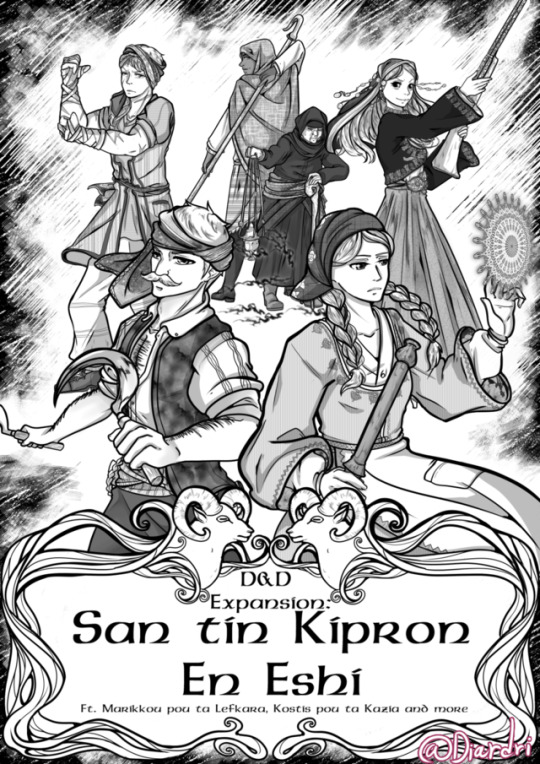
“DnD Expansion Pack: San tin Kipron En Eshi” parody poster for CCC.
I was kinda nervous about doing something related to my own culture because I've had a love/hate relationship with it for a long time but I quite like how this turned out!
The idea was to use traditional dress/occupations/stories as base for different dnd classes.I think I'll make each character a little bio later expanding on that a bit more.
The text is Greeklish for "No place like Cyprus" a phrase we use semi-ironically a lot.
#DnD#Cyprus#dungeons and dragons parody#traditional clothes#cypriot folk costume#folk costume#fantasy#magic#sickle#gun#mufflon#original#original art#dia does art#fantasy art#monochrome#digital#digital art
4 notes
·
View notes
Text
Christmas, New Year‘s Day and Epiphany traditions of Greece
There was a post on another website with many comments about traditions from various Greek regions that was very informative and interesting. The number of the comments was outrageous so I gathered here as many as I had the patience to read and translate. Also, as this comes from many people’s experiences, there may be inaccuracies regarding the customs or the range of the area where this custom takes place.
Cephalonia, Heptanese islands
On New Year’s Eve people get out in the streets and spray perfume to each other, their houses and shops. They accompany this with the wish “Ήρθαμε με ρόδα και άνθους να σας πούμε χρόνους πολλούς” (=We came with pomegranates and flowers to wish you a long life).
Cephalonians also do not wish with a typical “Happy New Year”. In stead of this, they say: “Καλή Αποκοπή” (kalí apokopí) which pretty much means “Good riddance to the previous year”. Seems especially appropriate this time.
Pontic villages of Macedonia and Thrace
Pontic Greeks of the aforementioned regions celebrate the custom of Μωμόγεροι (Momóyeri) throughout Christmas, New Year’s Day and Epiphany. The custom involves a theatrical dance around town and the dancers are dressed in wolf and billy goat skins. Others are dressed like men, wield swords and are hidden behind masks that resemble old men. There are also three protagonists, the old man Kití Ghotsá, the Bride and the Young Man. The custom has pagan Ancient Greek origins and it was initially revived in Livera, Trebizond, modern-day Turkey. It belongs to UNESCO’s Intangible Cultural Heritage. In Kastoria, West Macedonia, they celebrate Ragoutsaria which is similar.
Litohoro, Macedonia
On New Year’s Day, in Litohoro, the town in the shadow of Mount Olympus, people eat a billy goat pie.
Achaea, Peloponnese
Achaeans eat fried liver and drink wine early in the morning after church on Christmas day. On New Year’s Day, they touch iron to take its strength, look over at the mountains and wish to “live as long as the big mountains” and eat loukoumades with honey so that the new year will be sweet.
Attica, Central Greece
There people have to wash their faces outside with cold water on New Year’s Day. Then they hit each other with a branch of olive tree on the head (softly) for good luck.
Yannitsa and Florina, Macedonia
In Yannitsa and Florina they celebrate the custom of Kolinda Babo on December 23rd. Groups of friends gather piles of wood and create big cones with them and light a fire. The group with the biggest cone / best fire wins. That day fasolada (Greek bean soup) and wine are served. The custom symbolizes a warning to the grandmothers to hide the children King Herod comes to kill. The name of the custom has Slavic origin.
Chios, Islands of Northeastern Aegean
In Chios they take the Greek custom of decorating a ship (instead of a tree) a bit further. Groups of people from different neighborhoods of Chios town build merchant and war ships, 5,5 meters big. On New Year’s Eve, every team presents its ship with music and carols. The team with the best ship wins a prize and then takes the ship around all the neighborhoods.
Ikaria, Islands of Northeastern Aegean
On New Year’s Day, Ikarians get out to sing Saint Basil’s (our Santa Claus) carols. The owners of the first house of a village get out first and sing the carols to their neighbors. Then the neighbors get out too and all together they go to sing to the next house and so on. When they reach the last house in the other edge of the settlement, the whole village is now out and sings the carols. The people do not come near the houses that grieve someone’s loss and even if they do by mistake, the house owners do not come out to join the others.
Emporio of Eordaea, Kozani, Macedonia
On New Year’s Eve children and adults dress up, kinda like in Carnival, and hide their faces. They visit neighbors who give them treats and alcohol. They stay at a house and get treats until the owner finds out who they are.
On New Year’s Day, men wear traditional costumes and join the feast and dance in the village square. There is also a guy who carries a whip, supposedly to keep the men under control. Whoever shows up with regular clothing is thrown either in the river or in a barrel with freezing water.
Thrace
In Thrace, instead of Vasilopita, they bake a milk - cheese pie and instead of a single coin they hide inside it a “little symbolic treasure” for each family member.
On New Year’s Day, people visit their elder relatives and hit them with a branch of dogwood on the back for good health.
Fragades, Zagori, Epirus
Young children sing New Year’s Eve carols. The oldest child carries a thin branch of dogwood (again) and hits with that the owner of the house for good health.
In this region, they do not make a Vasilopita (Saint Basil’s cake) like in most of Greece. They make a meat pie inside which they hide a small piece of dogwood and a small piece of vine. Whoever finds the dogwood will be healthy all year long and whoever finds the vine will have the most alcohol!
Zakynthos (Zante), Heptanese Islands
On Christmas Eve, Zakynthians eat a broccoli soup called Brokolina.
On Christmas Day, they have an Avgolemono soup, made of eggs and lemon. Also, in order to make a good Avgolemono soup, you have to kiss it. Yep, you heard that right. This is actually a thing in the entire country and my mom does it too!
Cyprus
On Epiphany’s Eve, Greek Cypriots throw loukoumades on the roofs of their houses, so that the goblins will eat them and leave.
Pontus, Turkey
Pontic Greeks light candles to commemorate the dead of the family every Epiphany Day. They start with the loved person that died most recently and progressively go back in time. Those candles are called “μνημοκέρια” (mnimokéria).
#greece#europe#culture#customs#tradition#greek culture#heptanese#macedonia#thrace#northeastern aegean#peloponnese#epirus#central greece#turkey#cephalonia#zakynthos#zante#achaea#attica#florina#chios#ikaria#kozani#zagori#ioannina#grevena#pieria#litochoro#yannitsa#cyprus
89 notes
·
View notes
Text
St Mark The Evangelist
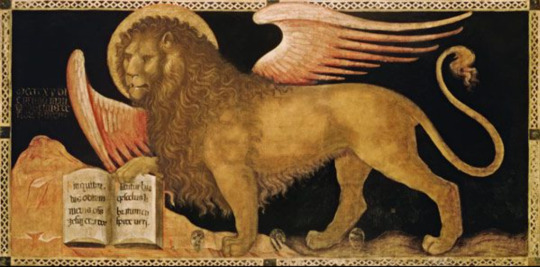
Feast day: April 25th
Patronage: lions, lawyers, notaries, opticians, pharmacists, painters, secretaries, interpreters, prisoners, and people dealing with insect bites.
Much of what we know about St. Mark, the author of the Second Gospel, comes largely from the New Testament and early Christian traditions. Mark the Evangelist is believed to be the 'John Mark' referred to in the Acts of the Apostles, the history of the early Church found in the Canon of the New Testament.
He was the son of Mary of Jerusalem (Acts 12:12) whose home became a meeting place for the apostles. He is also the cousin of St. Barnabas (Colossians 4:10), a Levite and a Cypriot.
Mark joined St. Paul and St. Barnabas on their first missionary journey to Antioch in 44 A.D. When the group reached Cyprus, Christian tradition holds that Mark left them and returned to Jerusalem, possibly because he was missing his home (Acts 13:13). This incident may have caused Paul to question whether Mark could be a reliable missionary. This created a disagreement between Paul and Barnabas and led Paul to refuse Mark's accompaniment on their second journey to the churches of Cilicia and the rest of Asia Minor.
However, it can be assumed the troubles between Paul and Mark did not last long, because when Paul was first imprisoned, Mark, who was at the time in Rome with plans of visiting Asia Minor, visited him as one of his trusted companions (Col 4:10).
Mark's hopes to visit Asia Minor were most likely carried out, because during Paul's second captivity and just before his martyrdom, Paul wrote to Timothy at Ephesus advising him to "take Mark and bring him with you [to Rome], for he is profitable to me for the ministry" (2 Timothy 4:11). If Mark returned to Rome at this time, he was probably there when Paul was martyred.
According to Christian tradition, Mark also held a close relationship with St. Peter, who referred to Mark has 'his son' in his letter addressed to a number of churches in Asia Minor (1 Peter 5:13). Clement of Alexandria, Irenaeus and Papias all indicate that Mark was an interpreter for Peter.
Although Papias states Mark had not personally heard the Lord speak firsthand and, like Luke, Mark was not one of the twelve apostles, some believe Mark was likely speaking of himself when he wrote the description of Jesus' arrest in Gethsemani.
"Now a young man followed him wearing nothing but a linen cloth about his body. They seized him, but he left the cloth behind and ran off naked" (Mark 14:51-52).
13 notes
·
View notes
Text
Cypriot Folk Dancing, likely mid-20th century.
Cypriot folk music comprises of a number of traditional instruments from the Levant, North Africa and southern Europe. Shown in the video specifically, are the violin and the oud. Popular dances, including the garşılama, is presented here.
Both men and women can be seen wearing traditional Cypriot clothing, including the tsemberi/çember, sayia/uç etek, vraga, and yileko/yilek.
#cypriot#cyprus#cyprus history#archive#cypriot archive#cypriot heritage#cypriot history#cyprus archive#history#cypriot dance#cypriot traditional clothes#mediterranean#west asia#levant#cypriot fashion#historical video
1 note
·
View note
Text

Turkish Cypriot woman, Cyprus
#turkish#cypriot#turkish cypriot#cyprus#europe#eastern europe#folk clothing#traditional clothing#traditional fashion#cultural clothing
334 notes
·
View notes
Note
https://greekreporter.com/2022/07/14/russell-crowe-fought-to-add-greek-accent-as-zeus-in-thor/
The most interesting part is this one:
Waititi said he realized in post-production, “it’s actually more offensive to the Greeks to have Zeus sound like he’s British. And test audiences loved the Greek accent. I’m really happy with it.”
Key word: "More offensive"
So, wait, he knows it is "somewhat" offensive, either way, and yet draws the line at the British accent which he was so into in the beginning.
Why not just get a Greek actor? So that at least one part of his movie is not offensive (let's be honest, the entire thing is too much).
Also:
Greek audiences have yet to weigh in on whether they find Crowe, a New Zealander who has lived most his life in Australia, offensive in fashioning a Greek accent onto the most powerful of Greek gods.
It keeps getting better and better. . .
I got one more ask about that but I didn't answer it yet because I hadn't seen the whole movie, just a scene with Zeus. But this article did it for me xD
I realized that in the movie many elements from the comics were ridiculed including Zeus powers and demeanor (he is mightier and more serious in the comics, imagine!). I don't think Waititi was the man to direct this, I am sorry. Yes he could get a Greek. He knows how to find us and how to recognize culture (for one, his work "what we do in the shadows" is famous for this. He has a Greek Cypriot there and lets her do her thing).
Now, okay, the accent offers more comedic value to the scene. I laughed but I also felt guilty about it because it was a very bad and half assed Greek accent. Like he did only one day of study and nailed only 10% of it. I mean I would expect a full-blown accent from someone coming directly from Greece. But he only brushed the surface with his "skill". I barely recognized it as Greek tbh, I was actively looking for the parts he did well and they were only a few moments.
But also why would Zeus not know how to speak with a native English accent? He is a freaking god and this doesn't make sense xD On the other hand I am sure that most USians have no idea how a Greek accent sounds like and they now realized that such an accent can exist. And maybe now they are wondering what happened to the Greek language in 2022, which is good 😂
Bad and good vibes. But they think the negatives outweigh the positives for a biiiit because the only purpose of this was to be silly - fuck me they already threw all accuracy out and now they remembered it? - and not educational or to bring any awareness to anything Greek whatsoever. I am happy if any Greek immigrant was happy with this scene but for me it was like we are begging for scraps and they threw us food burned to a crisp.
Pair this with the "skirt" movie joke Greeks are hearing about their high military and traditional clothing, aaaaand it's not a good look. Why would Taika screw this so much... :( I repeat that I laughed and I saw what they were trying to do but I think so many things went wrong. I am guessing his test audience about the scene didn't have Greeks/of Greek descent in 👀 Because, like the article says, we really don't know how to feel about this. I think I'd feel better if they kept the actor's accent because it would be correct at least... I mean no other foreign god (like Thor??) has an accent
46 notes
·
View notes
Text
Aphrodite as 100 years of Greek fashion (part 1)
Before writing this long essay post, I just wanted to give props and citations of information to both @alatismeni-theitsa and @greek-mythologies for introducing me a lot of things about Greek arts, culture, and its past history over several months now; and that this idea was also partly inspired from the common idea of modern Hellenic Polytheists as well: that “the gods are often enormously powerful beings who don’t have definitive physical bodies, and they often manifest/appear to whomsoever they wish and in any form that they wish to.” To me, since both Aphrodite and Ares have always been appeared as local Mediterranean Greeks in modern-day clothing fashion, here are some photos of what the couple themselves would wear/ dress like for over past 100 years ago.
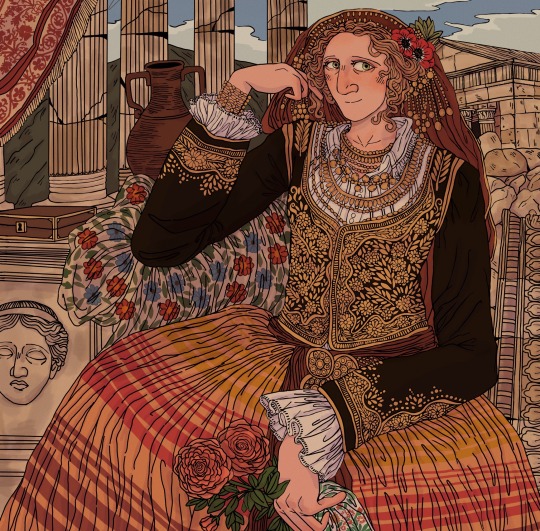
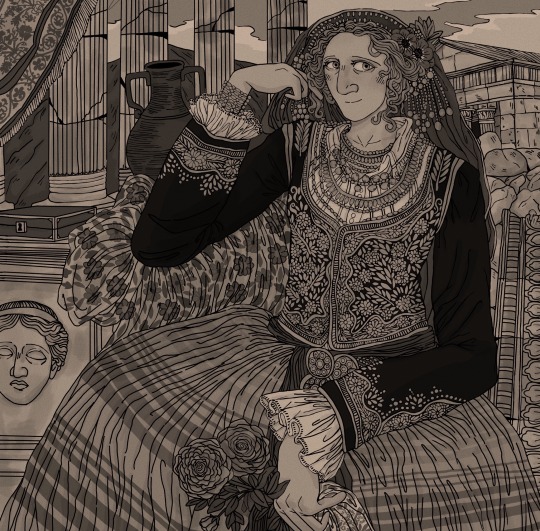
1910s:
During this time and era, Western European fashion from the Edwardian era haven't reached to most of the Greek population, yet; and only to be worn by the royal aristocratic class and the affluent wealthy class. It was much more transition period due to the effects of Second Industrial Revolution, to be exact. Villagers who lived in both rural and developing areas back then often wore the traditional clothing (paradosiaki foresia), consisted of a simpler attire: shirt, skirt, apron, and handkerchief for women. (Even though this is not really a case for all the affluent wealthy class, as sometimes they wore traditional fashion or a fusion mix between both modern and traditional, in some occasions.) Aphrodite, in this case here, as the goddess of sex, love and beauty, wore “the traditional folk kaprasia bridal dress” from the island of Cyprus as usual, with the traditional ornate golden jewelry that Greek Cypriot families often passed down from generations to generations.
Historically, this is also the time when all countries in the Balkan region (Greece, Bulgaria and Serbia) forming allies together in order to help smaller European territories to gain independence from the ever slowly-dying Ottoman Empire; but later turn hostile towards to each other due to the partitioning of their conquests. The political Greek royal family and the Greek Prime Minister also began to ripping the Greek society apart; as Konstantinos I was married to Kaiser Wilheim II’s sister while the Greek government Eleftherios Venizelos was allied with the Allied Powers, British Empire, and France. This period of time, also marked “one of the largest chain of tragedies and sadnesses within the modern Greek history”; as the famous Greek genocides were being committed in the Anatolia region of Turkey, on the basis of their religion and ethnicity. With the fall of the Ottoman Empire and the assassination of Franz Ferdinand of Austro-Hungarian Empire, and other problem factors that related to “Socio-Darwinism” and “colonialism” across Africa and Asia, World War I begins and Greece declares war on the Central Powers in 1914, ending three years of neutrality by entering World War I alongside Britain, France, Russia, and Italy.


1920s:
During this time and era, Europe just formed a fragile peace treaty together and WW1 had made a fundamental and irreversible effect on society, culture, and fashion; where women’s fashion were all often associated with the ideas of “letting loose”, “breaking free” and “rebel against” the physical and social constraints of the previous century. Letting go away from the extravagant and restrictive styles of the Victorian and Edwardian periods, and towards a more simple, more casual chic, and looser clothing which revealed more of the flowing silhouette, the arms and the legs. This idea might have originally started in Paris and popularized by Gabrielle Chanel, paralleling with the idea of “women’s participation on the war, have the right to vote and entering the workforce to win her own liberty” -which later spread to many parts of urban cities across the Americas and Western Europe. Despite this, since Greece has always been much more socially-culturally modest and much more conservative than other Northern European countries during this time: it is either that Greek women embraced these new long flowy dresses where their skin was less revealed, or that women still embraced the dresses from the past Victorian-Edwardian eras. (But I personally think that Aphrodite herself would passionately embraced these new minimalist flapper-like looks, to be honest.)
Aphrodite’s dress and hairstyle in here was inspired from Princess Aspasia Manos of Denmark and Greece, and Queen Victoria Eugénie of Battenberg and Spain; since during this time, high end fashion trends were now become much more cheaper and affordable to people who coming from the middle working classes. The jewelry that she wore around her neck were the strands of pearls - one of the common characteristic that was popularized by Gabrielle Chanel during that time and had always been considered as “the sacred stone of love” to the goddess herself back in the ancient times- and a necklace of red coral beads. Her once ancient golden jewelry is now remodeled and incorporated with new gemstones, which was a kind of common case during that time, too. Her husband, the god Ares here wore the usual local traditional fustanella from the region of Thessaloniki-Macedonia that you guys had saw in my previous drawings. The architectural background was based on one of the oldest and the most beautiful neighborhoods in modern city of Athens, Plaka and several other neoclassical architectural pieces around the city’s center.
#aphrodite#ares and aphrodite#ares#mars and venus#mars#venus#modern day greek mythology#100 years of fashion#100 years of beauty#greek history#paradosiaki foresia#my art#kaprasian bridal dress#100 years of Greek fashion#1910s fashion#1920s fashion
107 notes
·
View notes
Text
MEET THE MUSE POWER HOUR!!
━━ take a seat and REPOST this detailed little bio with criteria to introduce the world to your muse. no reblog karma or tagging ━ if you see this on your dash, feel free to partake in it!
☆ ━ B A S I C S .
NAME:: Zinon Konstantinou / Republic of Cyprus
NICKNAME(S):: none actually, as his name comes from Ancient Greek; it’s possible that his name is already short for some other name that has been lost in time. But if you want to pay him back on his usual sweet talk and make him melt in private or embarrass him in public, you can call him Zinakis (Zinaki mou) or Zizis (Zizi mou). Note that these are Greek diminutives so they work under the assumption that your muse knows Greek too. In English I guess you can use Zino, tho he’ll probably wonder what’s the point of dropping just the last letter of his already short name
AGE:: around 2,300 yo, says he’s 28 in physical age
GENDER:: male, he/him
NATIONALITY:: Cypriot
☆ ━ A P P E A R A N C E .
EYE COLOR:: green-brown/hazel
HAIR COLOR:: dark brown (dark enough that you might be fooled to think his hair is black until you see it flare copper in sunlight)
HAIRSTYLE:: a simple, short/medium haircut with voluminous curls falling over his forehead and the sides and back cut a little shorter (short enough that the curl texture can be hard to see fresh after a haircut). Maintains a careful hair routine to keep his curls looking their best and meticulously styles his hair every morning as in its natural state it can get pretty wild and frizzy
HEIGHT:: 174 cm / 5′8 1/2′’
WEIGHT:: 71 kg / 157 lbs
BUILD:: lean, broad shouldered, athletic... defined but not bulky, most of his muscles are in his legs from his running hobby
TATTOO(S):: olive branch on the left side of his chest over his heart, and text tattoos on both of his forearms (on the inside as they’re not really meant to be shown off but exist more as personal reminders), the right arm reading “ΙΧΘΥΣ” (ichthys, fish in Greek but also a Christian acronym) and the left arm “ανέχου και απέχου” (anéchou ke apéchou, sustain and abstain), a motto from his favourite philosopher
SCAR(S):: bullet entry and two surgery scars on his right shoulder, lash marks on his back that he refuses to talk about, lots of shrapnel from the WWs dotting his torso and legs, circumcision scar, various nicks and scratches on his arms and shoulders that he probably can’t (or doesn’t want to) recall the origin of. In case you were wondering, he has enough steel in him to set off airport metal detectors
PIERCING(S):: left earlobe, usually wears a peridot stud there
PREFERRED FASHION:: fitted t-shirts, chinos, and loafers for shoes, and if he wants to get fancier, he’ll throw a blazer on top. He likes quality (read: expensive) brands. Sometimes he’ll also wears button-ups outside of work but unless he’s going to the church, there is no force in the world that can make him button the shirt all the way up. He also likes wearing jewellery: besides his earring, he wears a golden cross necklace under his shirt and a thin golden band on his right ring finger (fake wedding band to ward off unwanted attention and uncomfortable questions about his marital status), as well as a watch... don’t expect it to actually help him be on time tho
TYPICALLY SMELLS LIKE:: woodsy and citrus-y cologne that may have been applied a little too generously, cigarette smoke that clings to his clothes and hair, whatever stuff he styles his hair with, and coffee breath
☆ ━ P E R S O N A L I T Y .
POSITIVE TRAITS:: allocentric || appreciative || calm || caring || challenging || charming || creative || compassionate || dramatic || efficient || focused || imaginative || liberal || loyal || neat || non-authoritarian || observant || witty ||
NEUTRAL TRAITS:: stubborn || perfectionist || sarcastic || confident || prideful || competitive || rash || unsentimental || artful || casual || complex || emotional || honest || outspoken || sensual ||
NEGATIVE TRAITS:: abrasive || argumentative || blunt || crass || cynical || egocentric || fatalistic || hesitant || indulgent || irritable || lazy || libidinous || meddlesome || moody || neurotic || passive || possessive || vague ||
LIKES:: cooking and eating good food, drinking coffee, indulging his loved ones, plants and flowers, nature/green spaces, the colour green, running (away from his problems), reading philosophy and self-help books, saving money (but also shopping expensive stuff; his argument here is that buying a quality item is an investment), pomegranates, math, napping and sleeping in when he can, and watching Hallmark movies and chic flicks (a secret guilty pleasure)
DISLIKES:: being yelled at/criticised/scolded, admitting that he’s in the wrong or doesn’t know the answer, being stuck in traffic, things/people not working the way he thinks they should, falling short of his own (high) standards, someone calling Cypriot coffee Turkish (call it Turkish at your peril), answering questions about his personal life or socioeconomic and geopolitical Situation™, rain/snow, being cold, the smell of roses, high fives, cockroaches, and wearing socks
PHOBIAS / FEARS:: failure, never being good enough, becoming corrupt, becoming a burden to his loved ones, being useless/unneeded and thus unwanted, losing his composure/self-control (and relating to his fear of losing control, he’s also somewhat emetophobic), thunder, public speaking, and horses
HABITS:: carries a frappe with him about half the time, smokes like a chimney especially towards the evening, talks with his hands, sometimes drives his car with no hands, always fiddling with something in his hands (if nothing else is available, the komboloi comes out from his pocket), is casually affectionate with others both verbally and in gestures, and apologises a lot (istg “I apologise” has become his catch phrase)
☆ ━ R E L A T I O N S H I P S .
SEXUAL ORIENTATION:: gay
ROMANTIC ORIENTATION:: gay
RELATIONSHIP STATUS:: his life is a mess and he’s married to his job (and the other issue is with his ‘deviant’ sexuality... however it doesn’t mean he never has needs for intimacy and may occasionally seek out casual relationships)
☆ ━ H E A L T H .
CHRONIC CONDITIONS:: depression, PTSD, neuropathic pain in his right arm due to nerve damage, chronic stress and insomnia (constant fatigue, restlessness/anxiety, tension headaches and occasional dizzy spells as by-products of all the other stuff)
ADDICTIONS:: nicotine (stress smoker with roughly a pack a day habit) and coffee, likely also dependent on antidepressants to function
(drinks alcohol very carefully in polite company - never more than two drinks - but drinks quite heavily in secret... and also lapses into a drinking spree once a year around dates that have no good memories associated to them)
ALLERGIES:: N/A
☆ ━ H O M E .
PLACE OF RESIDENCE:: two bedroom flat in Strovolos, Greater Nicosia, and a village house in Pano Lefkara (and also a villa in Paphos tho this one is rarely used)
METHOD OF TRANSPORTATION:: by car if the destination is more than 5 mins away
PETS:: considers himself too busy to keep pets, he has houseplants instead
☆ ━ W O R K & E D U C A T I O N.
JOB:: has an office job in the Ministry of Foreign Affairs, along with his representative and diplomatic tasks as a nation (has enough paperwork that he often ends up burning the midnight oil to get through it all)
SCHOOLING:: school of life he received his primary education from the Greeks, Romans, and Arabs, and was later educated mostly by Orthodox priests and bishops. He has been trained in the arts of war and diplomacy both by the Frankish kings and later in the Enderun Palace School in the Ottoman era. Most of his formal education is from the modern era and he holds degrees in Classical Studies, Medicine, Economics, International Relations, and Public Policy from the universities of Oxford and London. He hasn’t practiced medicine since the 60s and dropped the title of “Dr” with his most recent name change. He is still certified as a medical officer in the National Guard and has the skill set roughly equivalent to an EMT
SPOKEN LANGUAGES:: Greek Cypriot and Turkish Cypriot vernaculars, Standard Greek and Standard Turkish (both with a distinct Cypriot accent), English (with RP accent), French, Arabic, Farsi, Latin, Ancient Greek, Koine Greek, and bits and pieces of Russian, Italian (more specifically Venetian), Armenian, German, and Cantonese
SKILLS:: cooking, gardening, lying, carrying secrets, handling various weapons, emergency/battlefield medicine, sewing, playing tavli (aka backgammon), playing the piano, calligraphy (his handwriting is really pretty to look at but then you look closer and realise it’s illegible), traditional and modern dancing, mixing drinks, interpreting and translating thanks to being fluent in like 7 languages, scary quick mental math
☆ ━ R A N D O M .
QUIRKS:: follows Stoicism as a life philosophy (he seems sweet and unassuming on the surface but dig a little deeper and you hit the bedrock pretty quickly), cannot take a compliment (but secretly craves them), doesn’t like asking for help, collects komboloi (aka worry beads) - the nice ones made with real gemstones and silk tassels, has the patience of a saint but there is a limit to it and you don’t want to see what happens when that limit reached, is ridiculously sensitive to cold, battles an ongoing national identity crisis, and teeters on the edge of a burnout every few weeks
RELIGION:: Greek Orthodox Christian (devout in his faith but has a few personal issues with the church and its views)
THEME SONG(S):: What The Water Gave Me - Florence + The Machine
#🌿 | know first who you are and then adorn yourself accordingly (hcs)#me introducing my muses: and on this side of the rink we have a certified hot mess#in case you were wondering why I've been quiet recently#this thing is the reason#this thing took me two months of research so you better like it xD jk#sorry it's long but tungler refused to let me put a readmore
6 notes
·
View notes
Text
she hates when they yell. so much yelling. eser has taken to hiding as far from the yelling as possible.
she’s just eser. cyprus, sometimes. usually. not today. today that title belongs to her brother. and to him, she is nothing more than a tumor, a growth that should be cut off and cast into the sea -- a growth that prevents the greekness of their island. and that hurts. it hurts because these are her people, too. and her people don’t want this.
and she storms out and yells that at him, ‘ these are my people, too ! i belong here, too ! ‘
she isn’t greek. she is cypriot, first. she doesn’t want to be greek. her people don’t want to be greek. they just wanted to be them! she’s crying and he hits her. and she knows he doesn’t mean to. if the look on his face tells her anything it was merely a result of her anger. she hits back, tiny fists wailing on his chest. not to do damage. she’d never want to hurt him. but she wants him to know he’s hurting her. he’s hurting their people.
it hadn’t been a surprise. it had been creeping up in bursts of anger. in glares and minced words between them. it was not surprise. but it still hurt. someone picks her up, hands and feet still kicking, tears still falling. ‘ give me back my brother ! ‘ she screams. the arms are strong and hold her close. she recognizes the voice, deep and warm. the scent, cinnamon and coffee. she lets her sobs turn to hiccups and stops her flailing.
she just wants her brother back.
she just wants her home back.
it’s a cold sweat when she wakes up. she shakes off the covers, her hands shaking as she pulls them back, casting them to the end of the bed. she swings her feet off, still wearing her socks from the night before. she pads to the bathroom. she doesn’t need a calendar to know what day it is.
the day is bittersweet.
she and zinon had been all but pretending the other didn’t exist for the week leading up to this day. there’s was still so much left unsaid between them. so much pain unresolved. it’s six fifty-two, according to the clock. sadik is sleeping on the couch, and she can hear his loud snores as she stares at her reflection. she splashes water on her face, drying it with the towel, and stares at her hair, still pulled mostly into her braids.
she looks down at her torso, locking the door and pulling off her night shirt. scars trail her body -- burn scars, deep cuts. echoes of a time she liked to forget. they ached today more than ever. she traces one on her bicep. it’s why she was always grateful for long-sleeves. prying eyes that she never wanted to answer. she wraps her arms around herself, forcing back tears.
she stares for a few minutes longer, takes a shaky breath and exits the bathroom. she pulls on a clean shirt and her favorite overalls -- the day requires she pick her most comforting clothes. she wraps her hair in a bright scarf, tucking the braids tightly beneath it, securing it with a crescent moon pin.
she performs her before-dawn prayer diligently, focusing on it and not the knot in her stomach.
she slides on her tennis shoes, almost worn through on the soles. she’ll have to get new ones soon.
she creeps out of the room and past the living room, avoiding the squeakiest parts of the floor and out the back door into the yard. she exhales, closing her eyes as the first rays of morning climb over the horizon. she takes off on her bike ( a boy’s bike, she’d begged for it for years and it made travelling the island as much as she did easier. she waves to those awake, preparing for the parades to come later. she doesn’t stop til she’s a half-mile outside the town proper and the road gets rather rocky and bumpy. she parks her bike and gets off, sitting down to stare off. the sun has risen higher now, casting it’s warm glow over the small island. she closes her eyes and lets it’s warmth bask her.
this has never been easy. the more things change --- the more they stay the same. she and zinon both still bear the scars of the 70s. it hadn’t been easy. on either of them. and she knew he was sorry.
he was her brother. but they were her people. his selfishness had torn them apart and it still ached in her heart. she stares off back at the town she’s left in the distance a half mile back. north lefkosa was home. more or less. while she prefered the quieter cities, her bosses prefered her close to them and she understood.
she stands, glancing at her watch. seven forty eight. she should head back to the municipality building and make sure things were okay. but she didn’t want this. she didn’t want any of this. she just wanted to hide away for the day. but she couldn’t. birthdays were a stupid tradition anyways. besides, she’d already gotten the gifts. she’d already had the cake, what more was important.
she loves today. she loves seeing her people so happy, so bright. she loves the way the music flows through the streets and everything seems ... better, just for a day.
she hates today. hates the way it makes her stomach twist and the way her brother avoids her. hates how it’s a day of mourning for him. she hates how it’s only been so recently things have even seemed somewhat normal.
she hates the memories it brings. the sickness, lying on the couch, unable to keep food down. all but locked away for fear of what may happen if they let her out of their sight. the pain -- in her very soul of losing her people. like being ripped in two. she hates it. she hates it. she hates it.
she hates how long she laid, curled up on herself, crying and crying and just wishing for things to come to an end -- however they did. she hates how she remembers the faces when she visited the villages afterwards. the haunted eyes of the children, the little boy who clung to her so tightly. she hates how it got to that point.
she hates that turkey is still here. she hates that no one sees her as anything more than occupied land. she hates that today just rubs that in her face.
she hates she doesn’t have her brother beside her anymore. that a line separates them -- in land and in their hearts. she hates how the both have the same stubbornness.
angry at the world, at herself, at her brother, she picks up her bike and sets back into lefkosa proper, past the villas on the outskirts, past the high rises, back into the walled city. back to her home.
even if it hurt.
#this is well over 1000 words#i'm posting it early bc i'm super excited for it#( * about !#( * writings !
6 notes
·
View notes